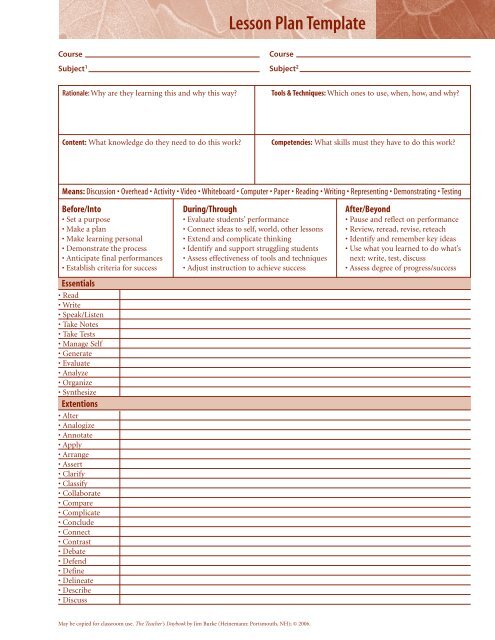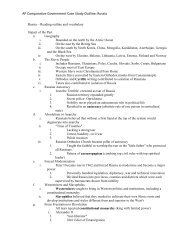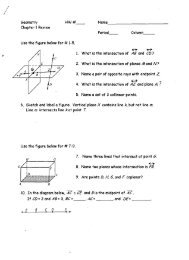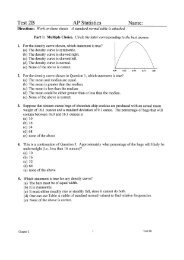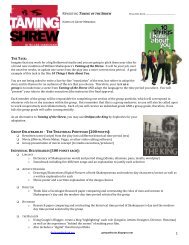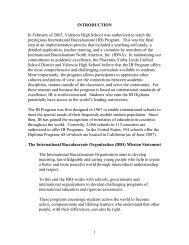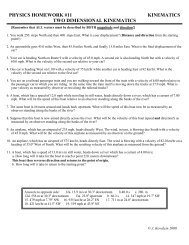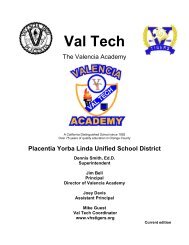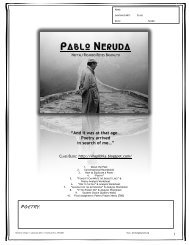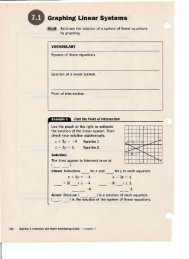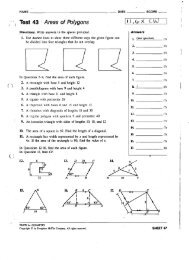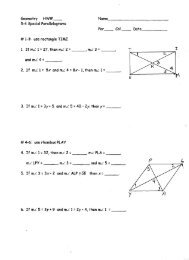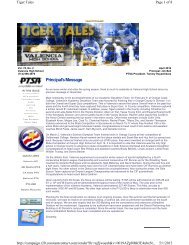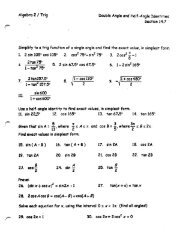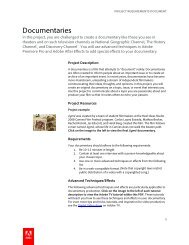Lesson Plan Template
Lesson Plan Template
Lesson Plan Template
You also want an ePaper? Increase the reach of your titles
YUMPU automatically turns print PDFs into web optimized ePapers that Google loves.
<strong>Lesson</strong> <strong>Plan</strong> <strong>Template</strong><br />
Course<br />
Subject 1<br />
Course<br />
Subject 2<br />
Rationale: Why are they learning this and why this way?<br />
Tools & Techniques: Which ones to use, when, how, and why?<br />
Content: What knowledge do they need to do this work?<br />
Competencies: What skills must they have to do this work?<br />
Means: Discussion • Overhead • Activity • Video • Whiteboard • Computer • Paper • Reading • Writing • Representing • Demonstrating • Testing<br />
Before/Into<br />
• Set a purpose<br />
• Make a plan<br />
• Make learning personal<br />
• Demonstrate the process<br />
• Anticipate final performances<br />
• Establish criteria for success<br />
Essentials<br />
• Read<br />
• Write<br />
• Speak/Listen<br />
• Take Notes<br />
• Take Tests<br />
• Manage Self<br />
• Generate<br />
• Evaluate<br />
• Analyze<br />
• Organize<br />
• Synthesize<br />
Extentions<br />
• Alter<br />
• Analogize<br />
• Annotate<br />
• Apply<br />
• Arrange<br />
• Assert<br />
• Clarify<br />
• Classify<br />
• Collaborate<br />
• Compare<br />
• Complicate<br />
• Conclude<br />
• Connect<br />
• Contrast<br />
• Debate<br />
• Defend<br />
• Define<br />
• Delineate<br />
• Describe<br />
• Discuss<br />
During/Through<br />
• Evaluate students’ performance<br />
• Connect ideas to self, world, other lessons<br />
• Extend and complicate thinking<br />
• Identify and support struggling students<br />
• Assess effectiveness of tools and techniques<br />
• Adjust instruction to achieve success<br />
After/Beyond<br />
• Pause and reflect on performance<br />
• Review, reread, revise, reteach<br />
• Identify and remember key ideas<br />
• Use what you learned to do what’s<br />
next: write, test, discuss<br />
• Assess degree of progress/success<br />
May be copied for classroom use. The Teacher’s Daybook by Jim Burke (Heinemann: Portsmouth, NH); © 2006.
<strong>Lesson</strong> <strong>Plan</strong> <strong>Template</strong><br />
• Distinguish<br />
• Draw<br />
• Elaborate<br />
• Estimate<br />
• Experiment<br />
• Explain<br />
• Extend<br />
• Hypothesize<br />
• Identify<br />
• Illustrate<br />
• Imitate<br />
• Infer<br />
• Integrate<br />
• Interpret<br />
• Isolate<br />
• List<br />
• Manipulate<br />
• Measure<br />
• Observe<br />
• Outline<br />
• Paraphrase<br />
• Perform<br />
• Persuade<br />
• Practice<br />
• Predict<br />
• Preview<br />
• Produce<br />
• Propose<br />
• Prove<br />
• Question<br />
• Reflect<br />
• Reinforce<br />
• Rephrase<br />
• Represent<br />
• Respond<br />
• Review<br />
• Revise<br />
• Skim<br />
• Speculate<br />
• Summarize<br />
• Support<br />
• Visualize<br />
Questions to<br />
Consider:<br />
• What can students say they know and are able to do as a result of what they did today?<br />
• What should they do for homework? How will that reinforce or extend what they learned today?<br />
• What should you do next, and how will that relate to what students learned today?<br />
• Which tools, techniques, and methods were most effective today with all students—and why?<br />
May be copied for classroom use. The Teacher’s Daybook by Jim Burke (Heinemann: Portsmouth, NH); © 2006.


